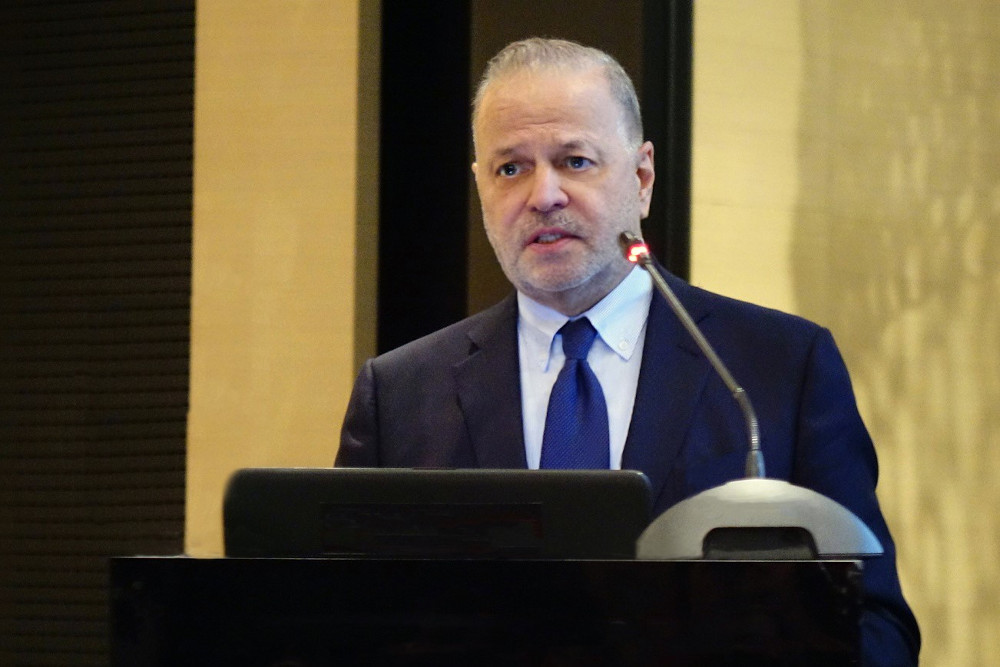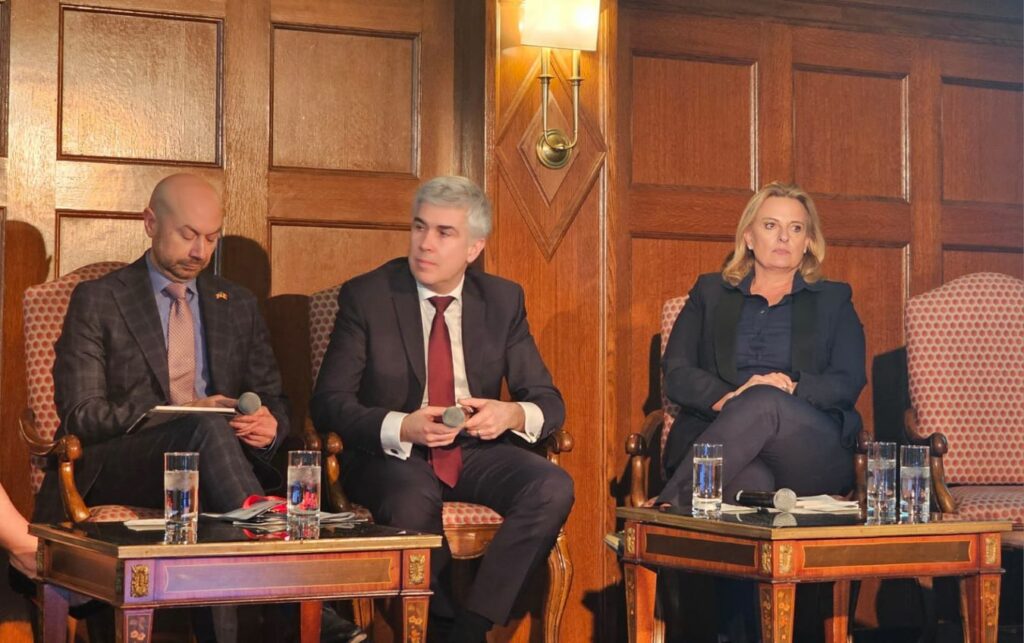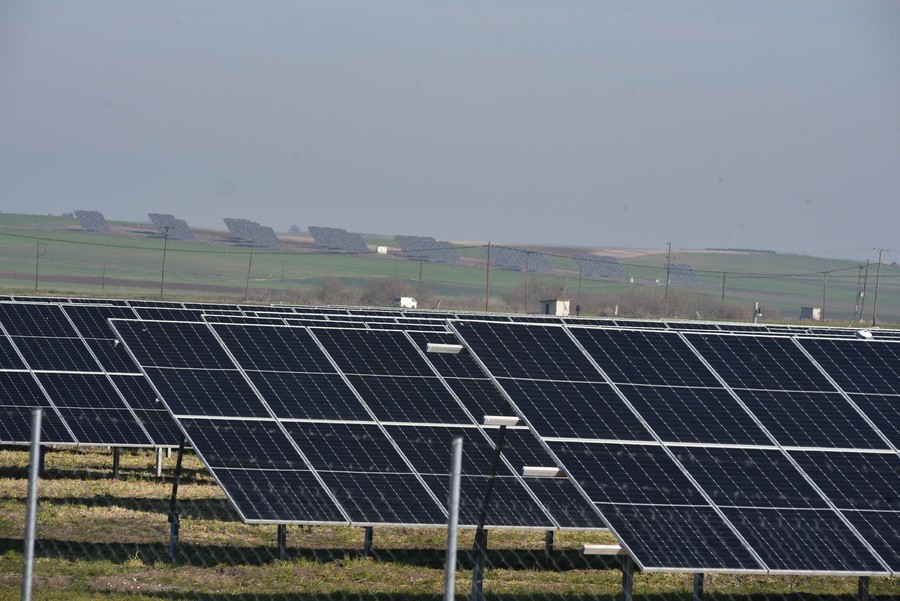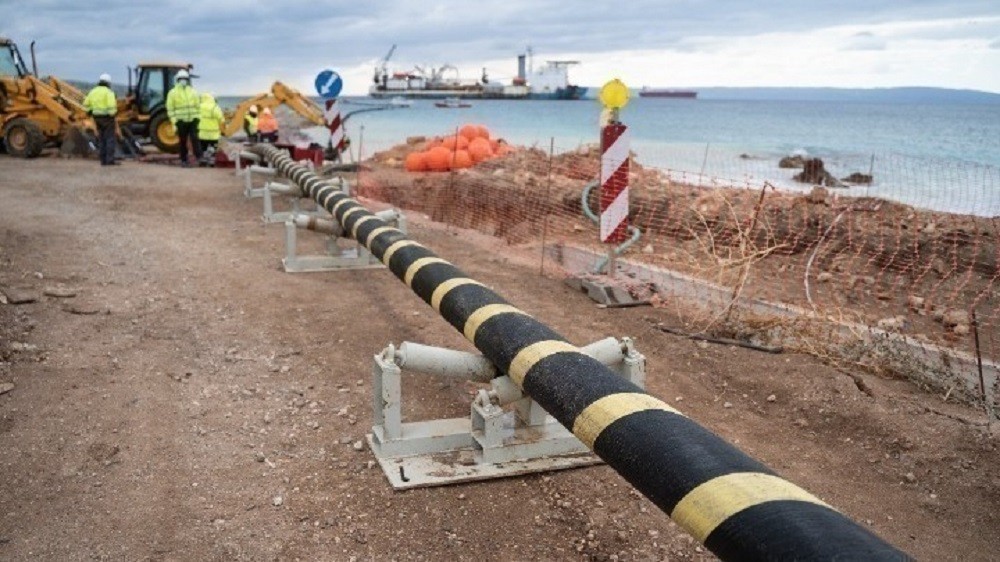
Vivian Bouzali, the Chief Corporate Affairs and Communication Officer for MYTILINEOS, on the impact of the current geopolitical turbulence and wars on Europe’s energy landscape

Vivian Bouzali, the Chief Corporate Affairs and Communication Officer for MYTILINEOS, Greece took part in a discussion with Viorel Ursu, Ambassador of the Republic of Moldova to the USA, Motaz Zahran, Ambassador of the Arab Republic of Egypt to the USA, Kalin Peshov, President, GBS Bulgaria and Vladimir Malinov, Executive Director, BULGARTRANSGAZ, Bulgaria. Photo Hellas Journal
Greek American relations, developments in the Balkan region and the situation in the Middle East took center stage this week during the 5th Southeast Europe and EastMed Forum, organized in Washington, DC by Kathimerini’s English edition, the Delphi Economic Forum, and the Hellenic American Leadership Council (HALC).
The discussions focused on the future of the Eastern Mediterranean, energy cooperation, and energy transition, but also on the challenges for the security architecture of the region. The conference is part of the 5th Forum for Southeastern Europe and the Eastern Mediterranean.
Vivian Bouzali, the Chief Corporate Affairs and Communication Officer for MYTILINEOS, Greece took part in a discussion with Viorel Ursu, Ambassador of the Republic of Moldova to the USA, Motaz Zahran, Ambassador of the Arab Republic of Egypt to the USA, Kalin Peshov, President, GBS Bulgaria and Vladimir Malinov, Executive Director, BULGARTRANSGAZ, Bulgaria.
The remarks made by Mrs. Bouzali follow:
What is the impact of the current geopolitical turbulence and wars on Europe’s energy landscape?
For almost two decades there has been continuous financial and geopolitical turbulence, with one crisis succeeding the other. These past decades have taught all to be agile and adaptive to the ever-changing circumstances.
The latest geopolitical unrest and that has tragically led to full out conflicts in Europe and the Middle East – has also created unprecedented challenges for energy security and energy transition.
As the world tries to heal from a global pandemic and surging inflation, tragic conflicts in the Ukraine and the Middle East, soaring energy costs and declining energy security, has forced a massive shift in .
Countries worldwide are working to address the energy “trilemma,” ensuring that energy remains accessible, affordable, and sustainable. The recent crises have exposed vulnerabilities in our current energy infrastructure, leading to an immediate, necessitated by the circumstances reliance on fossil fuels to navigate us through these challenges.
MYTILINEOS Energy and Metals is at the heart of these developments, and one of our main drivers is to assess the entire environment before it shapes up, not after. In the current circumstances, the coexistence of Energy & Metals is very protective against a volatile pricing environment.
For example, MYTILINEOS has effectively managed challenges, such as a significant decrease in premia and aluminum prices, to achieve record-high profitability in its Metallurgy Sector. The strategic synergies between the Energy and Metals Sectors have contributed to MYTILINEOS maintaining competitiveness on a global scale in aluminum and alumina production. The company’s position is expected to strengthen further, placing it in the first quartile of the global cost curve. This is attributed to the transition to less polluting energy sources, and the recent acquisition of IMERYS Bauxites, enhancing MYTILINEOS’ vertically integrated production model. And this is but a taste of the kinds of synergies we are after.
Diversifying energy sources to mitigate geopolitical risks is not merely a strategic choice, but an absolutely necessary one. It is the only way to ensure the resilience of our energy supply.
Effective strategic planning is crucial, while at the same time, one must also align national with regional interests and foster cooperation.
It is essential to compare the approaches of major players such as the EU, the US, and other global players, to shed light on the differing strategies aimed at tackling the effect of geopolitical challenges on the energy sector. The EU has chosen carbon pricing, whereas the US and China have chosen e a totally different path, which so far seems to be working much better.
Specifically, the US approach (IRA) is already proving to be a more effective way to drive decarbonization. The EU should reevaluate its approach and focus on creating a “climate club” with the US and other like-minded countries, to drive decarbonization while protecting the participating industries against unfair competition from countries with more relaxed climate/environmental policies.
The Southeastern Europe & East Med region plays a crucial role in shaping the new European energy infrastructure. MYTILINEOS actively contributes to this development through strategic projects like the Greece-Bulgaria electricity transmission line. Managing diverse assets, from thermal power plants to renewable sources, the company emphasizes cross-border cooperation and sustainability in its extensive involvement in electricity trading and supply across Southeastern Europe.
Question 2: How does MYTILINEOS view the importance of grids?
At MYTILINEOS, we see grids as a game-changer for our business, right after renewables. We believe they’re not just crucial for green transition, but they also open up growth opportunities and possible collaborations. Aligned with the EU’s focus, we understand the need for a substantial €584 billion investment in new networks and for the upgrading of existing infrastructure.
Grids are essential for the green transition’s success. We’re excited about our latest project – a £1 billion collaboration with GE Vernova for the Eastern Green Link 1 (EGL1) subsea link in the UK, which will power over two million homes with renewable energy from Scotland to England.
Looking at our track record, we’ve completed a significant 130km interconnection line between Maritsa East 1 (BG) and Nea Santa (EL), enhancing transfer capacity and ensuring safe integration of renewable energy in Northeastern Greece and Bulgaria. Our expertise in designing and building high-voltage lines is crucial for safe distribution and supporting increased power flows.
Question 3: What is the Influence of the Green Transition on Europe’s Energy Landscape?
In Europe, the focus has been exclusively on aggressively pushing for the decarbonization of energy, taking reliability and affordability for granted. We were painfully wrong. The transition requires new ways of thinking, and companies throughout the global energy ecosystem are expected to evolve and adapt in order to achieve this; not always in the way projected by high-level policy making.
The classic lines between power, oil, and gas sectors are blurred, as everyone is trying to transform. During the energy crisis, the Greek government quickly created a mechanism that would deal with challenge posed to households of surging energy prices.
The increase in energy costs has created serious issues for the operation of European industry, particularly energy & electro-intensive industry. The plan for a sudden abandonment of fossil fuels created tremendous headwinds for European industry, which began to leave the European continent.
So, Europe pushed for sustainability and green transition policies without evaluating whether European economies and societies can bear them.
As a true Energy Transition company, we put our money where our mouth is, and we see the see the challenges across the entire value chain.
We need to be honest. The energy transition will be long and costly. We still need to turn it into an opportunity. We should redesign policies and revisit regulations so that the energy transition offers broad economic benefits for the European Union citizens and industries.
Question 4: What is the future of energy in Europe?
Striking a delicate balance between ambitious decarbonization goals and ensuring energy accessibility and affordability is crucial for the future of energy in Europe. Redesigning policies, revisiting regulations, and strategically investing in key decarbonization technologies are fundamental steps.
We are a proactive player, heavily investing in electricity distribution grids, natural gas plants, and renewable energy projects. The company’s forward-thinking approach, aligned with pragmatic strategies, underscores a commitment to navigating the evolving energy landscape. Success in this transformative journey relies on effective coordination, innovation, and adaptability to changing market conditions.
The challenges faced by the European aluminum sector in 2024 emphasize the pivotal role of energy, necessitating a balance between competitive energy prices and short-term concerns. Examining new investments, MYTILINEOS’s focus on internationalization and expansion aligns with the evolving energy landscape, showcasing its ability to execute plans and manage risks effectively. The company’s ambitious yet realistic strategy positions it as a key player in sustainable practices, promoting positive change and global growth for all.
Ακολουθήστε τη HELLAS JOURNAL στη NEWS GOOGLE
